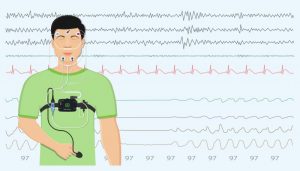The Importance of a Sleep Study
May 9, 2013

Every time I teach a seminar to dentists on treating snoring and sleep apnea, I get this question: “Dr. Smith, if I have a patient who comes in and says they want an appliance for their snoring, and that they know they don’t have sleep apnea, can’t I just make them a snore guard to help the snoring?”
It’s a legitimate question, and unless a doctor truly understands the field of sleep disorders, he or she could move down a path they should not have traveled. Allow me to explain.
First of all, this is a medical condition, and with any health matter, it is imperative (we call this the “standard of care”) to get a diagnosis before treating. The fact that a bed partner hears snoring does not a diagnosis make. Would a physician prescribe a medication for high blood pressure without first getting a diagnosis of hypertension? Never. The MD would use a sphygmomanometer to assess not only the presence or absence of hypertension, but also the severity. The same thing applies to sleep disorders. A diagnosis should always, without exception, precede a treatment for a medical problem.
Secondly, and perhaps more importantly, there is a condition known as “silent apnea”. I can’t tell you how often I have treated someone, had them tell me they were no longer snoring, and even felt much better, and after testing, see they still had sleep apnea. The “signal” of snoring which gives you insight into an abnormal pattern of sleep is no longer there in a silent apneic, so they are unwittingly involved in masking a problem, while not controlling it. This is also why follow up sleep studies are so important. In fact, research has shown that in roughly 75% of patients, when they think their apnea is controlled, it persists.
Finally, there is absolutely no other way to diagnose sleep apnea, other than with a sleep study. Many doctors purport that they find all types of equipment, ranging from radiological techniques to pulse oximetry to radio waves, to be vital components in their fact finding and diagnosis of sleep disorders. However, this equipment is just so much window dressing. To repeat, there is absolutely no other way to diagnose sleep apnea, other than with a sleep study.
For healthy sleep, I am
